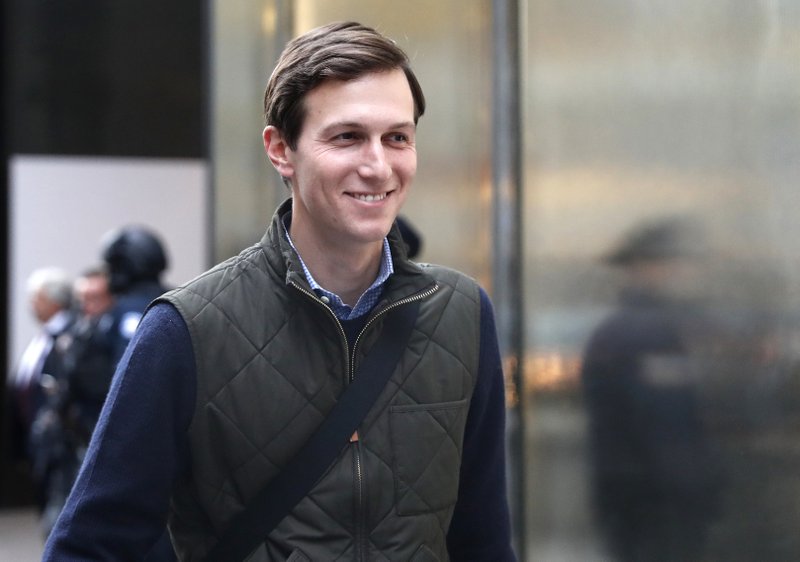NEW YORK -- President-elect Donald Trump appointed his son-in-law Jared Kushner as a White House senior adviser Monday, putting the young real estate executive in position to exert broad sway over both domestic and foreign policy, particularly Middle East issues and trade negotiations.
RELATED ARTICLES
http://www.arkansas…">Confirmation awaits all picks, Trump sayshttp://www.arkansas…">Trump scrutiny of factories sets auto-show tone
Trump has come to rely heavily on Kushner, who is married to the president-elect's daughter Ivanka. Since the election, Kushner has been one of the transition team's main liaisons to foreign governments, communicating with Israeli officials and meeting Sunday with Britain's foreign minister. He has also huddled with congressional leaders and helped interview Cabinet candidates.
Ivanka Trump, who also played a significant role advising her father during the presidential campaign, will not be taking a formal White House position. Transition officials said the mother of three young children wanted to focus on moving her family from New York to Washington.
Kushner's eligibility for the White House could be challenged, given a 1967 law meant to bar government officials from hiring relatives. Kushner lawyer Jamie Gorelick argued Monday that the law does not apply to the West Wing. She cited a later congressional measure to allow the president "unfettered" and "sweeping" authority in hiring staff.
[TRUMP: Timeline of president-elect’s career + list of appointments so far]
In a statement, Trump said Kushner will be an "invaluable member of my team as I set and execute an ambitious agenda."
He described his son-in-law as "a tremendous asset and trusted adviser throughout the campaign and transition."
Kushner will resign as CEO of his family's real estate company and as publisher of the New York Observer. He will also divest "substantial assets," Gorelick said, selling most of his New York holdings, his stake in his family's real estate business and other assets to his brother and a trust overseen by his mother. Ivanka Trump will also be leaving her executive roles at the her father's real estate company and her own fashion brands.
Kushner's father, Charles Kushner, a veteran real estate developer who was once imprisoned for tax evasion, will take an increased role in his family company.
Jared Kushner will not take a salary and plans to work on issues involving the Middle East and Israel, as well as collaborate with Trump's choice for commerce secretary, Wilbur Ross, on matters involving free trade, Gorelick said.
The scion of a prominent Democratic family active in New Jersey politics, Kushner has no governmental experience and had never played an active role in a campaign before he began to advise Trump. Though he is often viewed as more moderate than Trump, people close to him say he fully bought into the Trump campaign's populist message that resonated with white, working-class voters.
Kushner, who turns 36 today, emerged as one of Trump's most powerful campaign advisers during his father-in-law's presidential bid. Soft-spoken and press-shy, he was deeply involved in the campaign's digital efforts and was usually at Trump's side during the election's closing weeks.
He has continued to be a commanding presence during the transition, working alongside incoming White House chief of staff Reince Priebus and senior adviser Steve Bannon. He played a key role in coordinating Trump's contacts with foreign leaders and has been talking with foreign government officials himself, according to a person with knowledge of the conversations.
Last week, Kushner and Bannon -- the former head of Breitbart News -- met with British Foreign Minister Boris Johnson.
Kushner and Bannon have also worked closely on issues related to Israel, including discussions over moving the U.S. Embassy to Jerusalem and on the Trump administration's response to a United Nations Security Council measure condemning Israeli settlements.
Kushner is also weighing in on domestic policy. He joined other Trump advisers Monday night for a meeting with House Speaker Paul Ryan, R-Wis., on tax overhauls.
Those with knowledge of Kushner's role spoke on the condition of anonymity because they were not authorized to publicly discuss internal matters.
The anti-nepotism law had appeared to be the main obstacle to Kushner joining the White House. In arguing that the measure did not apply to the West Wing, Gorelick cited an opinion from two federal court judges in a 1993 case involving Hillary Clinton's work on her husband's health care law. She said Trump planned to seek an advisory opinion on the nepotism law from the Justice Department's Office of Legal Counsel.
Gorelick worked in the Clinton administration at both the Pentagon and Justice Department.
Norman Eisen, who served as President Barack Obama's government ethics lawyer, said there is a "murky legal landscape" regarding the anti-nepotism law. He said he advocated a "strict approach, but reasonable people may disagree."
But he said Kushner appeared to be taking the proper steps regarding the ethics and disclosure requirements for federal employees.
Information for this article was contributed by Jonathan Lemire, Julie Pace and Steve Peoples of The Associated Press; and by Maggie Haberman and Glenn Thrush of The New York Times.
A Section on 01/10/2017
